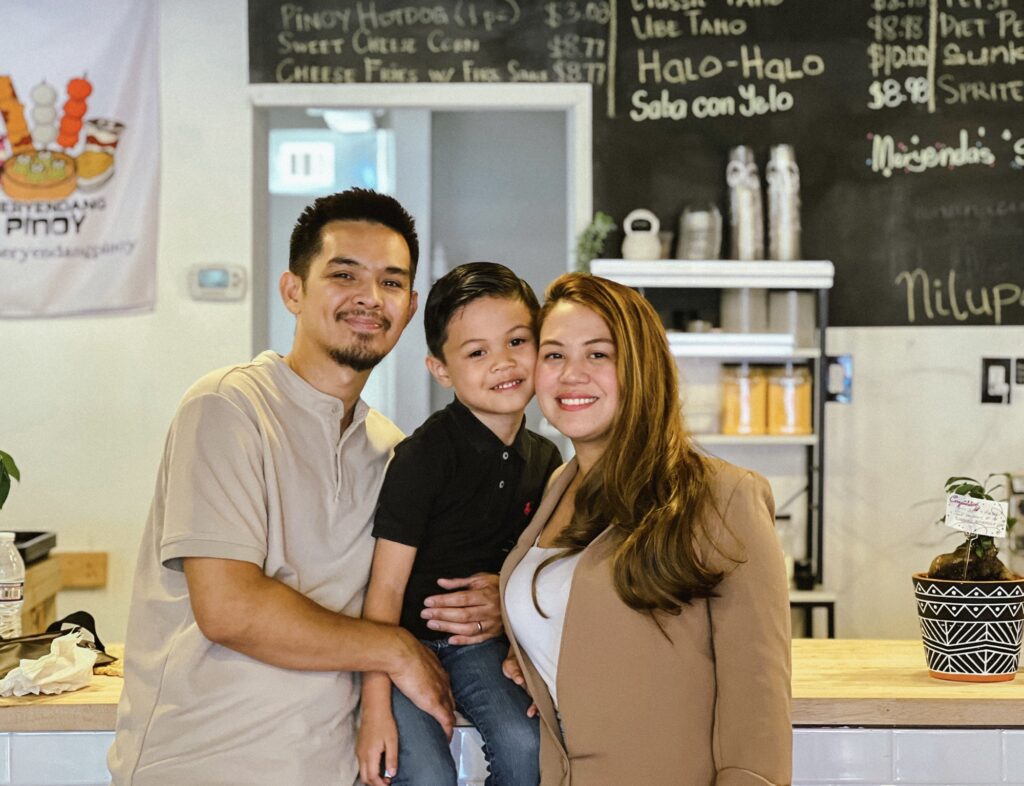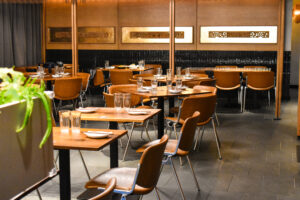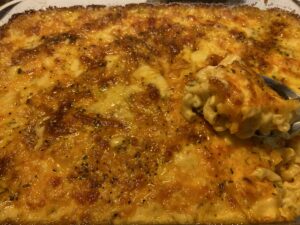Photo by Neidy Gutierrez / SOC Images.
Jhonacel and Josan Candelaria were both born and raised in the Philippines, but they didn’t meet until coming to the U.S. Though they didn’t know each other until early 2010s, they did have one thing in common: they didn’t really know how to cook.
Fast forward to roughly 14 years later, Jhonacel and Josan are now celebrating their almost two-month anniversary of Meryendang Pinoy, a Filipino street food restaurant that sells authentic pinoy snacks like Filipino hot dog, fishballs, ice scramble and more.
Jhonacel, who is now married to Josan and raising their six-year-old son, Jared, told Slice of Culture that opening their family-owned restaurant has been a dream come true.
“We’re always so surprised how people actually drive [to visit us]. They would tell us, ‘oh, I’m from Jersey Shore, I’m from Maryland, I’m from New York…’ And our guests would usually comment, ‘I remember this from my childhood…,’ which is amazing because we get so kilig [happy or excited] like, ‘Oh my gosh, really?’ It’s all our hard work paid off for us,” Jhonacel said.
“… This is actually a dream for me to be with my son and my husband while doing the things we love every day.”
‘Can You Teach Me How To Cook Sinigang?’
Jhonacel is originally from Batangas, which is in the northwest side of the Philippines while Josan is from Bicol, a region that’s on the opposite side of the country.
Growing up in the Philippines, Jhonacel’s mother sold halo-halo—a cold dessert of crushed ice, evaporated milk, ice cream and other ingredients. She also ran a fishball stand called Sauce “C,” playing off of her name, Celeste.
“She would ask me to roll the cheese sticks and then how to make the kwek-kwek [orange battered quail eggs]. From growing up, I adopted everything from her being a businesswoman… I fell in love [with] selling food,” she said.
For Josan, he didn’t learn how to cook until he started courting Jhonacel.
“I’d be like, ‘ate, can you teach me how to cook sinigang?’” he laughed. “… Then after that, every time she craves [something] I try to learn it. I always go to YouTube or something else. I’ve been learning a lot of stuff. I love cooking.”
That sentiment bounced off the walls of their restaurant, though still bare, was thoughtfully decorated with meaningful pieces including family photos, a big Philippines flag and, of course, items from the Meryendang Pinoy menu. Below the flag sat Jared, who had been attentive to his iPad until Josan, his father, mentioned sinigang, which is a popular Filipino sour and savory soup and, as he exclaimed, one of his favorite dishes.
“I like sinigang! I like sinigang, daddy!” he affirmed, making his parents laugh.
His parents met sometime around 2010 and 2011 while working at Max’s Restaurant, a Filipino chain spot, best known for its fried chicken, located on Newark Avenue in Little Manila by Journal Square. Jhonacel worked there for about three or four years while Josan was there for about seven. The two also spent time working together at Amanda’s Restaurant in Hoboken.

The Filipino Hotdog
Hotdog, pancit canton and rice. That was Jhonacel and Josan’s meal basically everyday because, when they started living together, they didn’t have much money.
“Our Filipino neighbor would be like, ‘what’s your ulam [lunch or dinner] for today?’ [And] It would be the same thing,” Jhonacel said.
But when the cravings for other Filipino dishes hit, the two would head to YouTube to learn how to make it. And when they did learn, Jhonacel would post the final product on social media and her friend would ask, “Where did you buy that?” and when told it was homemade, her friend joked, “Are you gonna sell it or what?”
But that joke wasn’t too far off, and it sparked an idea for the couple to get money for rent, groceries—more Filipino hotdogs and pancit canton—and other bills.
Meryendang Pinoy was officially born in 2019 in their home on West Side Avenue.
People ordered Filipino comfort food like turon, a dessert of banana slices wrapped in a spring roll; lumpiang shanghai, an egg roll stuffed with pork and veggies; and taho, a sweet treat of soft tofu, arnibal and sago pearl, to name a few, and picked it up right at the couple’s doorstep.
When the COVID-19 pandemic hit and Jhonacel and Josan were laid off from their jobs, they took the leap to sell food full-time. And after five years of hard work, pop-up shops and huge tray orders, they were able to acquire the storefront at 283 Newark Avenue, the first of its kind in the Historic Downtown area of Jersey City.
“We’re so grateful for the [Filipino] hotdog because without this budget meal, we’re not gonna be able to survive every month,” Jhonacel laughed. “We love how now we offer it to other people [and] how they are enjoying it.”
Kaya Mo Yan! (You Can Do It)
Leading up to the grand opening, Jhonacel and Josan were active in keeping their followers up to date through photos and videos on their Instagram.
Meryendang Pinoy officially opened on June 22. It was celebrated with balloons, a ribbon cutting with Jersey City Council President Joyce Watterman and an adrenaline-rush of orders, but Josan, who handles all the cooking, said he enjoyed the rush.
On that Thursday, the line was near the door and kept on growing throughout the day.
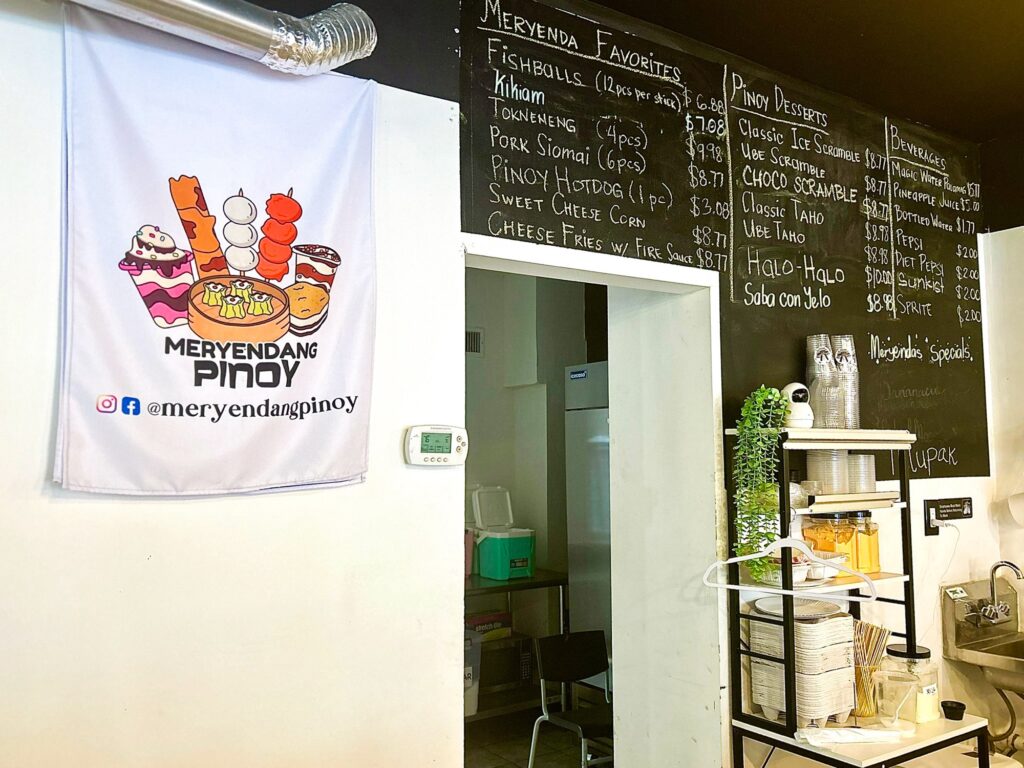
“I came all the way here just to try out the comfort food that they are introducing over here,” Irvin, a South Jersey resident, told Slice of Culture during the grand opening. “It definitely brings back nostalgia and just a lot of memories from back home.”
And that’s a comment that Jhonacel and Josan frequently get, which they said they didn’t really expect, but it “means a lot” to them.
Meryendang Pinoy—which roughly translates to Filipino snacks—mainly offers treats you’d see in the streets of the Philippines. That includes the signature Filipino hotdog, fish balls with sweet or anghang (spicy) sauce, lumpiang shanghai with sweet and sour sauce, squid balls and kikiam, which is deep fried fish, shrimp and squid. They also offer staple palamigs (cold drinks) like buko juice (coconut), calamansi juice and now halo-halo.
Halo-halo was added to their menu after a customer requested it. Jhonacel said they always try to make any customer requests, and you’ll usually see that on their specials of the day. They also recently added all-day breakfast options from Wednesday to Sunday, which includes traditional Filipino breakfasts like tocilog, tapsilog and longsilog, which all consist of fried rice and an egg, but with different meat options.
“Whenever they have a request, I would ask them, ‘when are you coming back?’ So we could make it for them and then we would put it in the Meryienda special,” she added. “So we have the regular menu, however we try to put something new and different every week.”
If you’ve never tried Filipino food, Jhonacel said to try the fish balls or pork siomai, which is a rendition of a traditional Chinese dumpling. You can pair it with some calamansi juice, which is the Filipino version of lemonade.
But those familiar with the food can feel right at home.
Whether it’s the bare walls with specific family photos and jeepney knick knacks on the wooden counter or the welcoming tone that the couple always offers while you hear and smell the sizzling Filipino hotdogs in the kitchen, it might trigger some type of nostalgia.
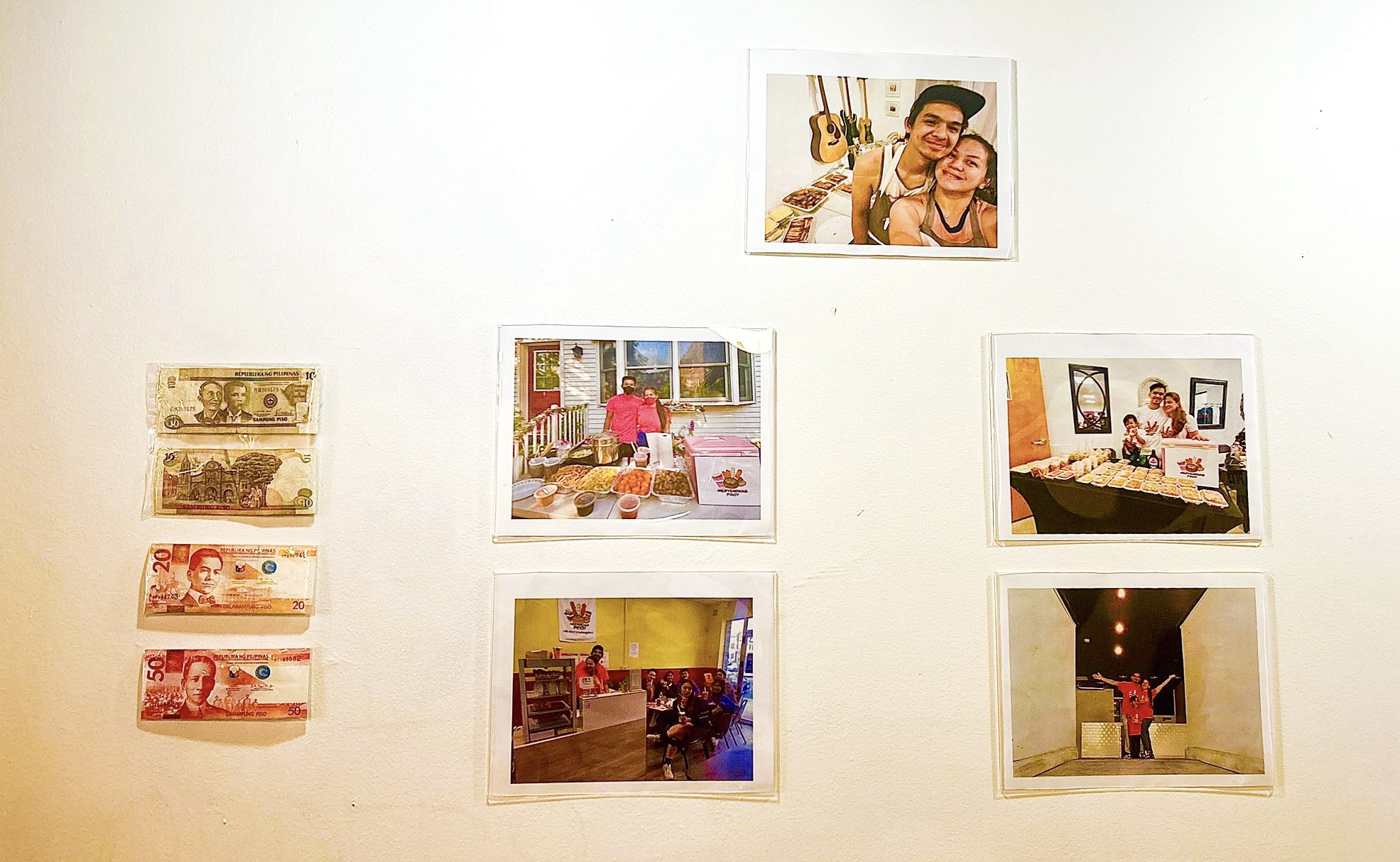
The couple has a number of projects lined up including catering; live cooking experience for fish balls; party events; and a winter menu. The winter menu would consist of lugaw, rice porridge with garlic and a boiled egg; batangas lomi, a noodle soup dish; champorado, Filipino chocolate rice pudding; and sopas, macaroni soup with vegetables and chicken.
“The downtown community is very supportive,” Jhonacel added. “[Customers] are like, ‘Finally someone is representing Filipinos here in downtown Jersey City because mostly everyone is in the West Side area, which we live there too [and] we love all the Filipino restaurants there, but we’re happy to hear how they’re happy that we are here now.

